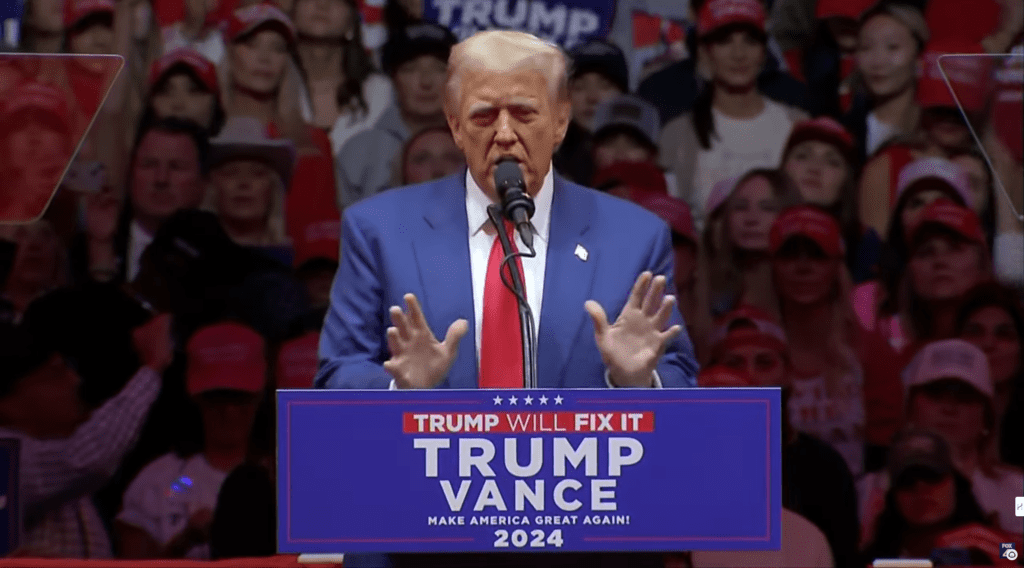
The world of American politics was jolted on October 28, 2024, when speculation about a ‘Trump election strategy secret’ began swirling. Former President Donald J. Trump made a cryptic statement during his rally at Madison Square Garden. Addressing Speaker Mike Johnson, who became Speaker in October 2023 after Kevin McCarthy was ousted, Trump teased, “I think with our little secret we’re going to do really well with the House, right?” This brief aside, paired with a knowing chuckle, unleashed a flurry of speculation among Democrats and political analysts.
Trump’s penchant for provocative rhetoric is nothing new. However, in the charged atmosphere of the 2024 presidential race, where Vice President Kamala Harris and Trump are key players, even an offhand remark can trigger a cascade of concerns. For many, the “Trump election strategy secret” hinted at an ominous plan involving House Republicans to disrupt or contest the certification of election results, echoing the tumultuous aftermath of the 2020 election.
The fear of Democrats and observers is not without basis. The memory of January 6, 2021, and efforts to overturn the 2020 election still linger. Speaker Mike Johnson’s past involvement in contesting those results adds to the anxiety. When pressed on Trump’s comment, Johnson’s response did not ease fears. He invoked past controversies, saying, “Harris knew Biden was physically and mentally impaired and kept it a secret… But this one might help Donald Trump, and now they care?” His words validated the existence of a ‘Trump election strategy secret’ and challenged the media’s scrutiny.
Johnson’s role as Speaker adds complexity. While the vice president presides over electoral certification, a speaker aligned with Trump could leverage lawsuits, challenge electors, and stir state election board discord.
The Electoral Count Reform Act of 2022 fixed vulnerabilities revealed in the 2020 election. This act tightened procedures to stop parties from undermining certification. One change raised the objection threshold from one member of Congress to 20% of both chambers. This adds protection but does not remove all risk. If Republicans, led by Speaker Johnson, reach this threshold, they could challenge certified electors. This move could reduce the total electoral votes needed for a majority below 270.
“The person having the greatest number of votes for President shall be the President, if such number be a majority of the whole number of electors appointed; and if no person have such majority, then from the persons having the highest numbers not exceeding three on the list of those voted for as President, the House of Representatives shall choose immediately, by ballot, the President. But in choosing the President, the votes shall be taken by states, the representation from each state having one vote.” — 12th Amendment
If certified electors fall below 270, a contingent election occurs. Each state delegation in the House casts one vote. Due to gerrymandering, Republicans hold a majority in state delegations. This scenario could enable Trump to win the presidency without the popular or Electoral College vote—a core part of the “Trump election strategy secret.”
In the lead-up to Election Day, Trump and his allies have employed a familiar strategy: casting doubt on the legitimacy of the electoral process. From claims about noncitizens voting to accusations of fraudulent mail-in ballots and unverified overseas ballots, these assertions have been echoed and amplified through social media and conservative media outlets. By emphasizing unsubstantiated issues, Trump has effectively planted seeds of distrust among his supporters. This groundwork of skepticism could serve as a foundation for contesting election results and exploiting procedural mechanisms outlined in the 12th Amendment. Such tactics are integral to what many now see as the “Trump election strategy secret.”
Election experts and officials have repeatedly pointed out that voter fraud is rare and that existing safeguards—such as signature verification, voter ID laws, and ballot tracking—protect the integrity of the voting process. Yet, these reassurances do little to quell the noise in an environment where misinformation spreads rapidly. This atmosphere not only primes Trump’s base to question the outcome but positions Republican leaders, like Speaker Johnson, to take advantage of the resulting uncertainty.
Democrats need to win control of the House in the 2024 election. A Democratic majority would act as a barrier against efforts to exploit the 12th Amendment. This majority could block attempts to decertify legitimate electoral votes or push the election into a contingent scenario. The balance of power in the House has implications beyond legislative initiatives. It plays a critical role in maintaining the integrity of the electoral process and protecting democratic norms. Securing the House is vital to prevent potential partisan challenges that could compromise election outcomes.
The political landscape in 2024 remains unpredictable. The Electoral Count Reform Act has strengthened the process of certifying results, but it has not eliminated the possibility of partisan manipulation. Trump’s “Trump election strategy secret” may involve using House Republicans to contest the certification of votes. Whether this strategy represents genuine political maneuvering or a ploy, the outcome depends on who controls the House. Ensuring a Democratic majority will be essential to upholding a fair certification process and safeguarding the legitimacy of the election. The coming months will test the resilience of the nation’s democratic institutions.